Berkshire Hathaway: The Insurance Float & Intrinsic Value
Companies / Corporate Earnings Mar 19, 2014 - 04:58 PM GMTBy: Rory_Gillen
 Warren Buffett often says that he considers Berkshire Hathaway’s balance sheet value (or net asset value) to be just a convenient proxy for the intrinsic value of Berkshire’s shares, but that their intrinsic value is a good deal higher. Here, we explain what Buffett means by this statement, we provide a range estimate for their intrinsic value and we place into context Berkshire’s 2012 commitment to buy back shares at a 20% premium to net asset value (book value).
Warren Buffett often says that he considers Berkshire Hathaway’s balance sheet value (or net asset value) to be just a convenient proxy for the intrinsic value of Berkshire’s shares, but that their intrinsic value is a good deal higher. Here, we explain what Buffett means by this statement, we provide a range estimate for their intrinsic value and we place into context Berkshire’s 2012 commitment to buy back shares at a 20% premium to net asset value (book value).
There are a number of reasons why Buffett argues that the intrinsic value of Berkshire’s shares is above the balance sheet value. The principal reasons are (i) the group’s ‘Insurance Float’ of $77 billion, which is deducted as a liability from the assets in arriving at Shareholders’ Funds (or the balance sheet value) add considerable unrecorded value and (ii) the value of the group’s majority-owned businesses would surely fetch more than book value, and perhaps considerably more, in the open market.

Buffett argues that the ‘Insurance Float’ is a very valuable and permanent source of liquidity, which can, and is, used to buy assets that then deliver a return for shareholders. As the ‘Float’ continues to grow, it is, in effect, never repayable and treating it as a liability is not the economic reality.
We agree with Buffett’s logic. At the end of 2013, Berkshire had a net asset value (balance sheet value) of $90 a share (the B shares). Adding back the value of the ‘Insurance Float’ (less any cost of acquiring the float; i.e. goodwill) would bring ‘Intrinsic Value’ up to $108 a share.
In terms of the majority owned businesses, the net assets tied up in the Railroad, Utilities & Energy businesses is $34 per share of which 25% or $9 is goodwill. That leaves $25 of net assets in this area that could be worth 1.5-2x the cost recorded on the balance sheet. This back-of-the-envelope analysis adds between $12-25 per share to ‘Intrinsic Value’ lifting it further to $120-133 per share.
In late 2012, the board of Berkshire Hathaway authorised the buy-back of its own shares at a 20% premium to net asset value. With Berkshire’s net asset value at $90 at end December 2013, the buy-back price is currently $108 a share, and rising (along with the growth in net asset value from one year to the next). With our, admittedly rough, estimate of the intrinsic value of each B share in a likely range of $120-133, the group is signalling that buying back shares at a discount to this value makes sense. We agree. Berkshire’s shares currently trade at $122 a share and probably at the lower end of their intrinsic value. Valuing companies is invariably an imprecise science, but that doesn’t negate the exercise.
Hence, despite the fact that Berkshire’s shares have risen 69% since we introduced them into the ‘Recommended List’ in late 2011, they continue to offer (intrinsic) value and we continue to argue that they should be in every subscriber’s portfolio, save those who need an immediate income from their investments.
Explanation of the Insurance Float & Why it is Valuable?
The job of an insurer is to take in premiums from customers and to make good on subsequent legitimate claims. Because of the timing lag between taking in premiums and paying out claims, the insurance operator is left with a cash pile which it is free to invest for its own benefit.
The economics of the insurance business are thus very attractive and, as a result, there is intense competition among insurers to generate the highest volume of premiums. Most insurers are forced to compete with each other mainly on the basis of price. Over time, this results in losses for the industry as a whole. This loss can be thought of as the cost of being allowed to use the float.
 If an insurance business runs at a loss but is wise in how it deploys the float, the gains generated from investments could outweigh the underwriting losses.
If an insurance business runs at a loss but is wise in how it deploys the float, the gains generated from investments could outweigh the underwriting losses.
Berkshire currently holds c. $77bn of insurance float, and has also generated a $22bn profit on its insurance businesses over the past 11 years. That is to say, Berkshire’s insurance operations have given it $77bn of float to invest as it sees fit, and it has been paid for the privilege of doing so.
Moreover, this float is constantly growing organically and through acquisitions. The table on the right indicates the growth of Berkshire’s insurance float since 1970: it has grown at 19% compound per annum, giving Berkshire access to an ever-growing amount of cash to invest.
Going forward, it is possible that intense competition or a natural disaster resulting in high claims payouts will cause Berkshire’s insurance operations to record a loss. However, this should not concern investors for two reasons:
- Berkshire’s insurers are outstanding operators in their respective fields, generating consistent profits over the years and never succumbing to the pressure to compete on price. They only do business on sensible terms, reducing the risk of losses.
- Buffett has proved himself capable of investing the float sensibly and, even if the insurers switch to operating at a loss over time, the returns on the float should outweigh this. In such a case, operating at a loss would merely mean that Berkshire now has to pay for the privilege of using the float.
How is the Insurance Float Used?
Float is normally used by insurers to invest in financial securities. Float acts like gearing or leverage, as it allows a business to invest beyond its normal means and to magnify the returns available.
Float is originally recorded on the balance sheet as a liability and the cash that it provides is recorded as an asset. Thus, when you look at Berkshire’s balance sheet, float is treated as a liability and deducted from assets.
While this follows standard accounting rules, it’s doesn’t necessarily give a realistic value for the insurance businesses. As we stated above, float can be thought of as leverage or gearing, but the comparison ends there: float is not debt but rather an increasing pool of liquidity.
Rory Gillen
GillenMarkets.com
Rory is the founder of GillenMarkets.com and the author of 3 Steps to Investment Success along with being a regular contributor to the media on issues affecting the financial services industry. He is a qualified Chartered Accountant, a former senior fund manager with Eagle Star, Ireland (now Zurich Ire.) and a co-founder of Merrion Capital in 2000 where he was Head of Equity Research among other roles for several years. In all, he has spent over twenty five years working in the financial services industry. He founded GillenMarkets (www.gillenmarkets.com) in 2005 as a stock market training company and obtained approval from the Central Bank of Ireland to provide investment advice in 2009.
© 2014 Copyright GillenMarkets - All Rights Reserved
Disclaimer: The above is a matter of opinion provided for general information purposes only and is not intended as investment advice. Information and analysis above are derived from sources and utilising methods believed to be reliable, but we cannot accept responsibility for any losses you may incur as a result of this analysis. Individuals should consult with their personal financial advisors.
© 2005-2022 http://www.MarketOracle.co.uk - The Market Oracle is a FREE Daily Financial Markets Analysis & Forecasting online publication.



